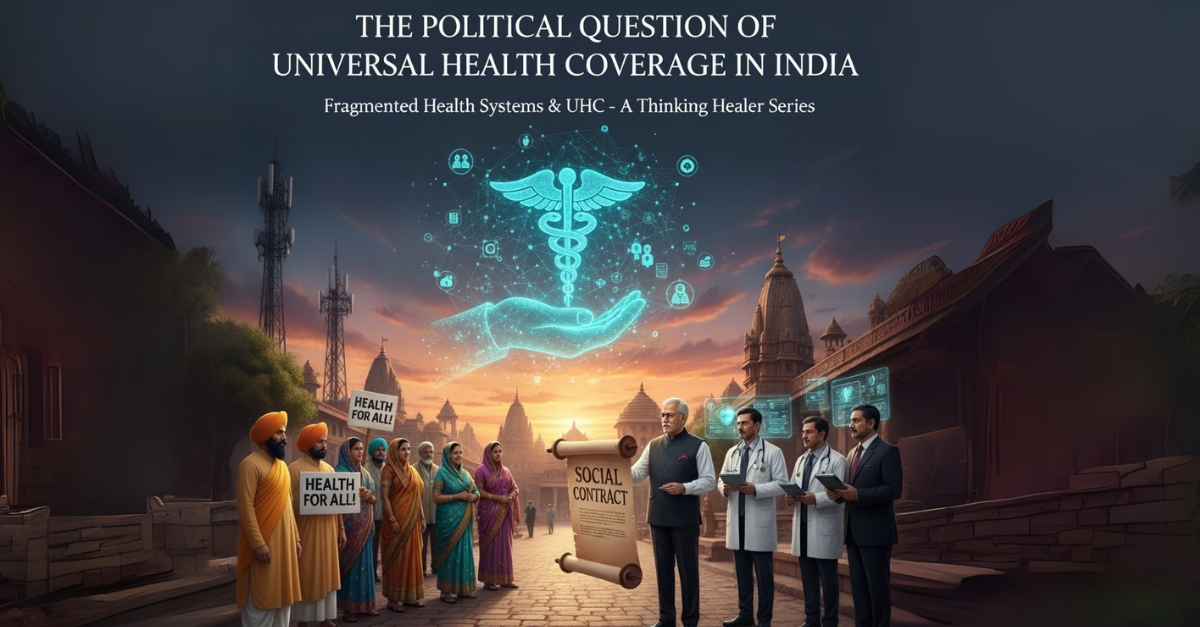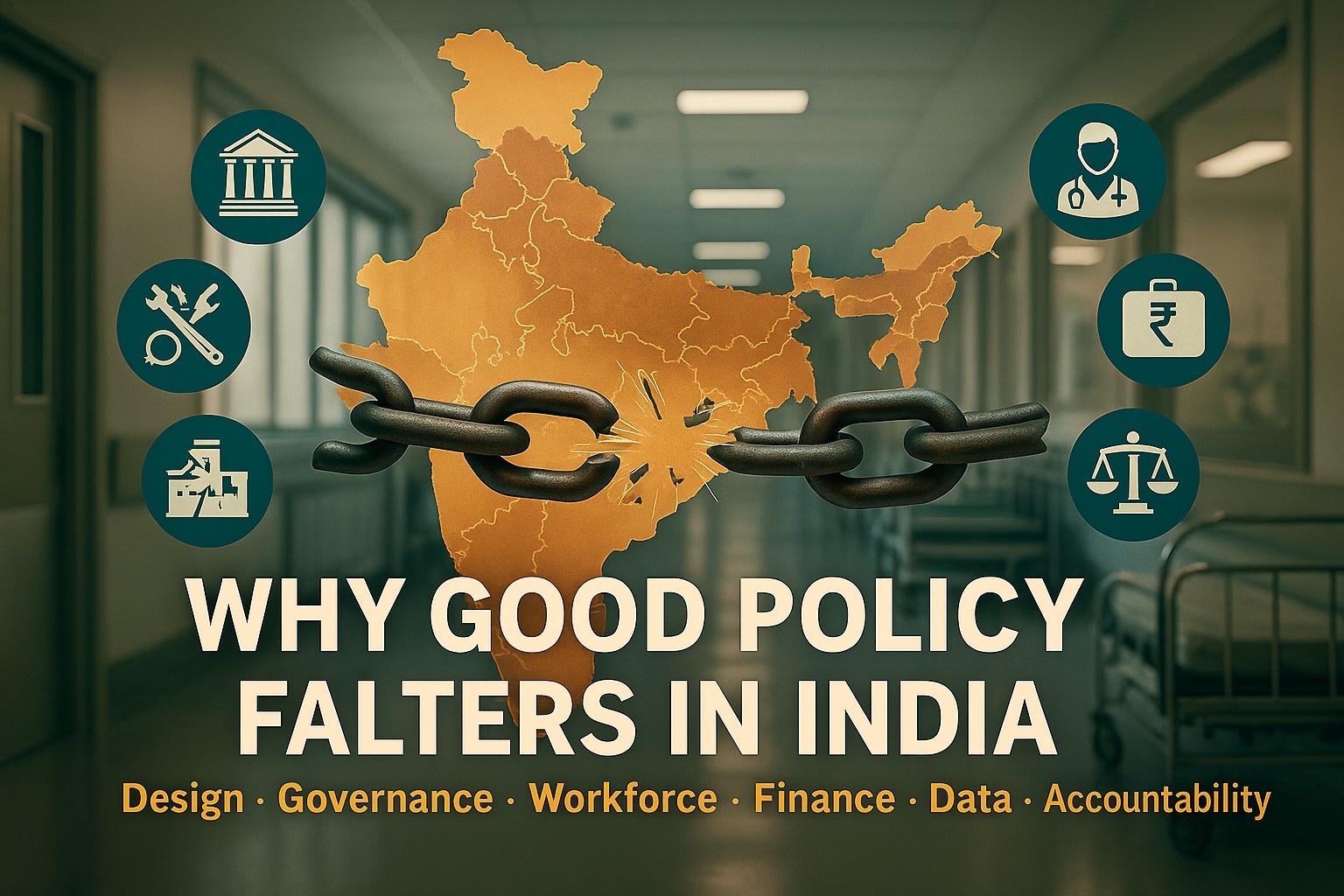Fragmented Health Systems & UHC—A Thinking Healer Series
When policymakers in Delhi announce another health scheme or insurance package, the headlines often highlight the numbers: crores of beneficiaries, lakhs of rupees of cover, and thousands of hospitals empanelled.
But beneath these technical metrics lies a far more profound political question:
-
Whose responsibility is healthcare?
-
What does “universal” actually mean in the Indian context?
-
How should the center and state share power in delivering it?
These are not peripheral debates. These debates deeply impact India’s democratic contract. To understand Universal Health Coverage (UHC) in India, we must step back—not just into health policy, but into political philosophy.
1. Whose Responsibility?
The Social Contract and the State’s Obligation
Hobbes: Life as the First Duty of the State
In Leviathan (1651), Thomas Hobbes described life without government as “solitary, poor, nasty, brutish, and short.” The sovereign exists to protect life itself. By Hobbesian logic, public health is not optional—it is a core duty of the state.
Locke: Natural Rights and the Protection of Health
John Locke, in Two Treatises of Government (1689), broadened this view: governments exist to protect natural rights—life, liberty, health, and property. The inclusion of health is striking: it elevates healthcare to a right, not just a service.
Rousseau: The General Will and Collective Obligation
For Jean-Jacques Rousseau (The Social Contract, 1762), legitimacy rests on the general will—the collective pursuit of the common good. Health, by this logic, is not private charity but a collective obligation.
The Indian Constitutional Mandate
India’s Constitution embeds these commitments:
-
Article 47: Directive Principle urging the state to improve nutrition and public health.
-
Article 21: The Right to Life, judicially expanded to include the right to health.
-
Paschim Banga Khet Mazdoor Samity v. State of West Bengal (1996): Failure to provide medical care violates Article 21.
-
Consumer Education & Research Centre v. Union of India (1995): Health is integral to life itself.
International Commitments
India also carries international obligations:
-
ICESCR Article 12 recognizes the right to health.
-
General Comment 14 (2000): Establishes the AAAQ framework (Availability, Accessibility, Acceptability, Quality).
-
WHO’s UHC definition: Access to essential health services without financial hardship.
2. What Does “Universal” Mean?
Competing Standards of Justice
-
Rawls: Justice as Fairness In A Theory of Justice (1971), Rawls defined justice as fairness. Norman Daniels extended this to health: health preserves fair equality of opportunity. UHC must prioritize the least advantaged.
-
Sen & Nussbaum: The Capabilities Approach Justice is about real freedoms to function. Bodily health is central. UHC should enable people to live lives they have reason to value.
-
Sufficientarianism: “Enough Is Enough” Harry Frankfurt argued that justice requires sufficiency, not strict equality. By this lens, UHC ensures minimum essential services, even if inequalities persist.
-
Libertarian Critique: Nozick and the Minimal State Robert Nozick (Anarchy, State, and Utopia, 1974) argued redistribution violates liberty. UHC funded by taxation is, in this view, unjustified state overreach.
3. Who Decides? The Federal Bargain
India’s health governance is shaped by federalism:
-
Entry 6, Seventh Schedule: Health is a state subject.
-
Yet, the Union dominates funding and design through PM-JAY, NHM, and other schemes.
Philosophical frames help illuminate the tension:
-
Rawls/Daniels: Redistribution toward weaker states.
-
Sen/Nussbaum: The center must guarantee a capability floor.
-
Foucault: Centralization risks reducing citizens to mere data points.
-
Gramsci: True reform must be co-owned by civil society, not imposed top-down.
4. Interim Reflection: The Crux of the Political Question
The first political question of UHC in India is threefold:
-
Responsibility: The state cannot abdicate its duty to safeguard health.
-
Universality: The design must prioritize the poorest and weakest.
-
Federalism: Balance national guarantees with state autonomy.
UHC is not merely a policy blueprint. It is a test of India’s social contract, its theory of justice, and its federal democracy.
References
-
WHO & World Bank: Tracking UHC 2023 Report
-
Hobbes, Leviathan (1651)
-
Locke, Two Treatises of Government (1689)
-
Rousseau, The Social Contract (1762)
-
Rawls, A Theory of Justice (1971)
-
Daniels, Justice and Access to Health Care
-
Sen, Development as Freedom (1999)
-
Nussbaum, Creating Capabilities (2011)
-
Frankfurt, Equality as a Moral Ideal (1987)
-
Nozick, Anarchy, State, and Utopia (1974)
-
Foucault, The Birth of Biopolitics (1979 lectures)
-
Gramsci, Selections from the Prison Notebooks
-
Constitution of India: Articles 21, 47, Entry 6
-
Supreme Court cases: Paschim Banga (1996), CERC (1995)
-
ICESCR Article 12 & General Comment 14







Dr Rahul Veer
Very thoughtfully written article.
Can you provide details what will be UHP for india ..